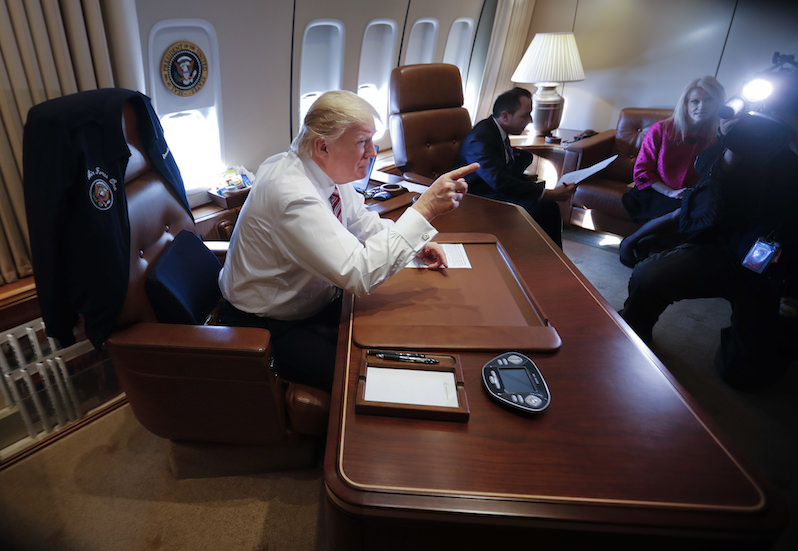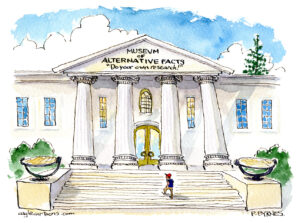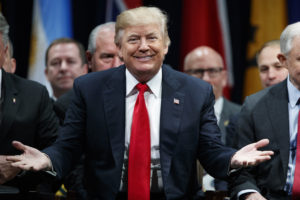Fake News and Donald Trump’s War on Truth
The Trump administration has skillfully turned the notion of fake news on its head and weaponized it against the media. The Trump administration has skillfully turned the notion of fake news on its head and weaponized it against the media.
The term “fake news” entered into popular usage soon after the 2016 general election, when Donald Trump beat most poll predictions and won just enough Electoral College votes in swing states to tilt the results in his favor. Many shocked Americans looked for explanations for how the unthinkable had happened.
One idea that jumped out was that some voters, particularly those who favored Trump, had been duped by fabricated reports sporting sensationalist headlines, specifically designed to be click-bait. Thus the idea of “fake news,” as an insidious and deeply out-of-control phenomenon with the power to sway elections, took hold.
No sooner had this theory been established than Trump and his surrogates deployed the idea themselves as an offensive tactic. In a recent tweet, Trump explained to Americans how he makes presidential decisions, saying, “I call my own shots, largely based on an accumulation of data, and everyone knows it. Some FAKE NEWS media, in order to marginalize, lies!” He has also dismissed surveys demonstrating the unpopularity of some of his policies in this tweet: “Any negative polls are fake news, just like the CNN, ABC, NBC polls in the election.”
It is a brilliant move, designed to keep the purveyors of fact-checked stories off balance and under suspicion.
Facts are the enemy of charlatans and con artists, hence Trump’s adviser and campaign chair Kellyanne Conway’s offer of “alternative facts” in the face of real ones on the size of Inauguration Day crowds in Washington, D.C.
In Trump’s milieu, bona fide news reports are considered “fake news,” while Conway’s lies (and those of the president) are simply “alternative facts.” In effect, Trump has skillfully turned the notion of fake news on its head and weaponized it against the media. All he has to do is dismiss any inconvenient media claim, no matter how well-documented and verifiable, as fake news and stand his ground. Most frightening—and dangerous—is the possibility that many of his supporters will believe him over The New York Times or The Washington Post.
Pushed to explain why she made up facts, Conway suggested that it was to counter criticism from the press. “Your job is not to call things ridiculous that are said by our press secretary and our president. That’s not your job,” she told NBC’s Chuck Todd. “Think about what you just said to your viewers. That’s why we feel compelled to go out and clear the air and put alternative facts out there.”
Sebastian Gorka, Trump’s deputy assistant, echoed that attitude recently when he told right-wing broadcaster Michael Medved, “There is a monumental desire on behalf of the majority of the media—not just the pollsters, the majority of the media—to attack a duly elected president in the second week of his term.” Gorka added, “Until the media understands how wrong that attitude is, and how it hurts their credibility, we are going to continue to say, ‘fake news.’ I’m sorry, Michael. That’s the reality.” Gorka basically admitted that the administration’s accusations of “fake news” are being wielded as weapons against a media establishment that he perceives is intent on embarrassing his boss.
Trump himself has been the generator of fake news for years, most notably his “birther” falsehood that Barack Obama is not a U.S.-born citizen. In response to popular anger over his “Muslim ban,” recently, Trump once again indulged in false claims. During a speech about terrorism, he said “It’s gotten to a point where it’s not even reported, and in many cases the very, very dishonest press doesn’t even want to report [terrorist attacks].” Later, his press secretary, Sean Spicer, reiterated the bizarre claim, saying that terror attacks “aren’t exactly covered to a degree on which they should be.” Journalists responded with factual evidence to the contrary.
The underreported type of terrorism both Trump and Spicer were referring to is that committed by Muslims against Muslims. Attacks by white supremacists, such as Charleston, S.C., shooter Dylann Roof, are naturally not included in the narrative being used to justify a “Muslim ban.”Conway, undeterred by the ridicule over her defense of “alternative facts,” offered up her own justification for the travel ban. Challenged to present evidence of a single attack carried out by citizens from the seven nations named in Trump’s executive order, Conway cited, several times, on different media platforms, a wholly fictitious incident: the “Bowling Green massacre,” an incident apparently “masterminded” by two Iraqi nationals. The claim made her the focus of yet another storm of online ridicule, but it is not yet clear whether that will be a deterrent.
Essentially, Trump and members of his administration are responding to strong criticism from the press by accusing it of creating fake news, and also by peddling fake news themselves.
But it’s not just Trump who has used such underhanded tactics. He is in good company with the Republican Party, which for eight years resorted to lies and exaggerations designed to undermine Obama’s policies and even long-standing social programs. The party’s favorite target was, of course, the Affordable Care Act, gleefully renamed “Obamacare.” (Perhaps the GOP was banking on negative connotations of the president’s foreign-sounding name among white Republicans?)
House Speaker Paul Ryan was among the most enthusiastic of the president’s colleagues in weaving lies about the ACA, frightening older Americans by claiming that, among other things, “because of Obamacare, Medicare is going broke.” In a Chapman University Survey of Americans’ fears, more than a third of respondents cited Obamacare—just a few percentage points below terrorist attacks and financial ruin. Ironically, about the same percentage of Americans feared someone they love becoming seriously ill. So deeply did Republicans convince Americans to fear Obamacare that an embarrassingly large number do not realize that Obamacare and the Affordable Care Act are one and the same. Younger Americans and lower-income people, who tend to need the ACA most, are also the most susceptible to getting caught in that mix-up.
Now that the GOP has realized that after a few years of enjoying the benefits of the ACA, many Americans prefer to keep it intact, Trump has postponed his often-promised repeal to next year and has still not identified a replacement for Obamacare. Perhaps, like the “fake news” phenomenon, the ACA will be replaced with itself, albeit with an alternative name.
“Fake news” and “alternative facts” are hardly new concepts. Right-wing websites, radio hosts and Fox News have engaged in untruths for many years, often angering Americans over liberal leaders and policies. A 2015 documentary by Jen Senko entitled “The Brainwashing of My Dad” followed how the views and personality of a one-time compassionate and liberal elderly American man were completely transformed after feeding himself a steady diet of right-wing news. In the film, Senko cited hundreds of Americans in similar situations whose family members reached out to her through her crowd-funding campaign.
In today’s era of instant communication, it is tempting to post, retweet and share reports without stopping to read them, especially when people feel anxious about politics. Even those on the left are susceptible to sharing fake news, especially at a time when Trump’s actions fly in the face of rationality, compassion and, most of all, the Constitution. Americans of all political stripes must resist the urge to jump on a story simply because it suits our worldview. Instead, we have to find a way to rationally evaluate the bizarre world in which we live today.
One thing we can count on is that lies and propaganda are what power-grabbers, elites and oppressors have always relied on to whip up support for ideas that would be highly unpopular if the truth about them were known.
Your support matters…Independent journalism is under threat and overshadowed by heavily funded mainstream media.
You can help level the playing field. Become a member.
Your tax-deductible contribution keeps us digging beneath the headlines to give you thought-provoking, investigative reporting and analysis that unearths what's really happening- without compromise.
Give today to support our courageous, independent journalists.





You need to be a supporter to comment.
There are currently no responses to this article.
Be the first to respond.